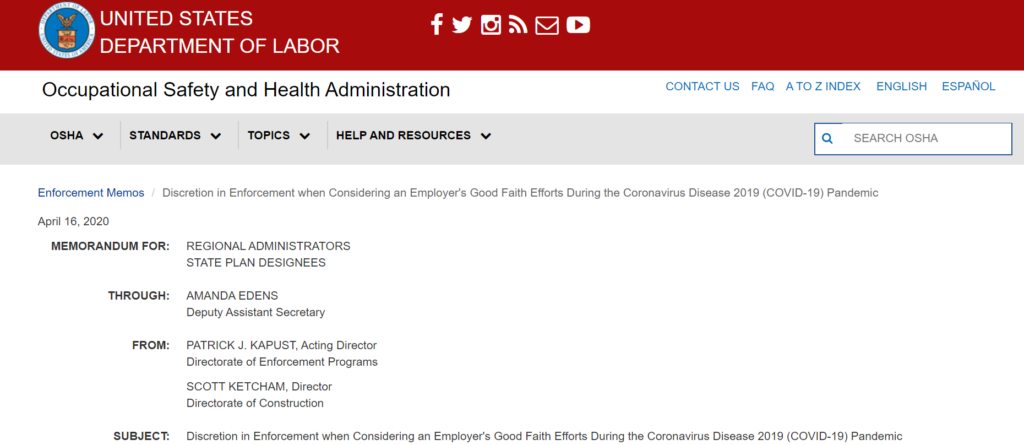Releases OSHA COVID-19 Enforcement Discretion Policy for PSM Facilities
OSHA issued a notice to its field offices on April 16, 2020 describing their COVID-19 enforcement discretion policy. (In addition to health and safety standards, this OSHA COVID-19 enforcement discretion policy notice applies to the Process Safety Management (PSM) Standard as well (29 CFR 1910.119). This guidance indicates that OSHA is willing to be more flexible about regulatory deadlines during the health crisis, but expects facilities covered by their standards to explore alternative means for achieving compliance. This may include the possible use of virtual training or remote communication strategies as part of the alternative means they expect.

The OSHA notice states:
“During the course of an inspection, OSHA Area Offices will assess an employer’s efforts to comply with standards that require annual or recurring audits, reviews, training, or assessments (see Annex below for some examples). Compliance Safety and Health Officers (CSHOs) should evaluate whether the employer made good faith efforts to comply with applicable OSHA standards and, in situations where compliance was not possible, to ensure that employees were not exposed to hazards from tasks, processes, or equipment for which they were not prepared or trained. As part of assessing whether an employer engaged in good faith compliance efforts, CSHOs should evaluate whether the employer thoroughly explored all options to comply with the applicable standard(s) (e.g., the use of virtual training or remote communication strategies). CSHOs should also consider any interim alternative protections implemented or provided to protect employees, such as engineering or administrative controls, and whether the employer took steps to reschedule the required annual activity as soon as possible.”
The notice offers an example of a PSM deadline and potential flexibility on compliance with that deadline:
“An employer contracts with a consultant to conduct process hazard analysis (PHA) revalidations. A PHA revalidation for the employer’s ammonia refrigeration process was due to be completed by April 1, 2020, but because of travel restrictions and shelter-in-place orders, the consultant was unable to fly to the employer’s location. OSHA will not cite the employer for failing to meet the three-year requirement for conducting a PHA revalidation, provided the employer considered alternative options for compliance, implemented interim alternative protective measures, where possible, and shows a good faith effort to reschedule the PHA revalidation as soon as the travel restrictions and shelter-in-place orders are lifted.”
This indicates that OSHA will not cite the facility for missing the deadline if:
- The facility explored alternative means of completing the PHA by the deadline, and
- Implemented interim alternative protective measures, to protect their employees against the hazards of the PSM covered chemical, and
- The facility shows a good faith effort to reschedule the PHA revalidation as soon as the travel restrictions and shelter-in-place orders are lifted, unless they complete the PHA using alternative means while under restriction.
What does this mean for your PSM covered facility?
Performing many PSM required activities can be successfully accomplished remotely. Online training via digital conferencing services and other remote means has been an increasingly common practice in recent years. These tools have successfully facilitated the performance of PHAs. The availability of reliable internet-based teleconferencing with audio, video, and screen sharing facilitates remote collaboration. Adapting these methods to other face-to-face PSM activities, like audits, is straightforward with proper preparation.
PSM covered facilities should not view this guidance as a blanket waiver of compliance requirements during the crisis. The guidance instructs OSHA inspectors to document attempts made by facilities to reach compliance and mandates additional inspections after the crisis for facilities with noted violations.
The OSHA COVID-19 enforcement discretion policy, while not explicitly addressing releases or incidents during the crisis, is unlikely to overlook PSM incidents, especially without good faith efforts towards compliance.
In summary, OSHA may offer flexibility in regulatory deadlines for those making good faith efforts, such as using remote/virtual means where appropriate. However, OSHA is unlikely to accept the suspension of PSM program aspects without justification. Delays must convincingly result from an inability to find reasonable alternatives during COVID-19 working situations. Companies must address compliance comprehensively, assess potential compromises in activities or deadlines, and make alternate plans accordingly.
